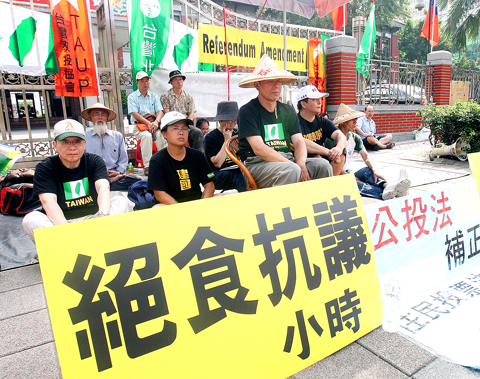Several pro-localization activists led by the Taiwan Association of University Professors (TAUP) continued their hunger strike in front of the legislature yesterday.
Wearing black T-shirts with the slogans “Taiwan is my country” and “Love Made in Taiwan,” the protesters are demanding an amendment to the Referendum Law (公投法).
The law, enacted by the Chinese Nationalist Party-dominated (KMT) legislature in 2003, stipulates that the number of signatures required for a referendum proposal to be reviewed is 0.5 percent of the voters who participated in the most recent presidential election — or approximately 80,000 individuals — with an additional 5 percent signatures from the population needed for a referendum to be held.

PHOTO: CNA
The law has long been criticized by the Democratic Progressive Party (DPP) as a “bird cage” law. The DPP has made several attempts to have the law amended over the past several years, but its proposals never clear the legislative floor.
The protesters began the hunger strike after participating in the opposition rally on Ketagalan Boulevard on Saturday. They have remained in front of the legislature since, with posters written in Chinese, Japanese and English demanding an amendment to the Referendum Law.
“I’m protesting against the Legislative Yuan by staging a hunger strike,” TAUP chairman Tsai Ting-kuei (蔡丁貴) said. “I will stay here until the law is amended.”
Tsai called for changes to the high thresholds stipulated in the law for a referendum to be passed.
A participant at the hunger strike surnamed Chueh (闕) said that everyone in Taiwan should stand up and oppose the KMT administration’s pro-China policy, saying it was “a matter of life and death.”

Taiwan is stepping up plans to create self-sufficient supply chains for combat drones and increase foreign orders from the US to counter China’s numerical superiority, a defense official said on Saturday. Commenting on condition of anonymity, the official said the nation’s armed forces are in agreement with US Admiral Samuel Paparo’s assessment that Taiwan’s military must be prepared to turn the nation’s waters into a “hellscape” for the Chinese People’s Liberation Army (PLA). Paparo, the commander of the US Indo-Pacific Command, reiterated the concept during a Congressional hearing in Washington on Wednesday. He first coined the term in a security conference last

Prosecutors today declined to say who was questioned regarding alleged forgery on petitions to recall Democratic Progressive Party (DPP) legislators, after Chinese-language media earlier reported that members of the Chinese Nationalist Party (KMT) Youth League were brought in for questioning. The Ministry of Justice Investigation Bureau confirmed that two people had been questioned, but did not disclose any further information about the ongoing investigation. KMT Youth League members Lee Hsiao-liang (李孝亮) and Liu Szu-yin (劉思吟) — who are leading the effort to recall DPP caucus chief executive Rosalia Wu (吳思瑤) and Legislator Wu Pei-yi (吳沛憶) — both posted on Facebook saying: “I

Sung Chien-liang (宋建樑), who led efforts to recall Democratic Progressive Party (DPP) Legislator Lee Kun-cheng (李坤城), was released on bail of NT$80,000 today amid outcry over his decision to wear a Nazi armband to questioning the night before. Sung arrived at the New Taipei District Prosecutors’ Office for questioning in a recall petition forgery case last night wearing a red armband bearing a swastika, carrying a copy of Adolf Hitler’s Mein Kampf and giving a Nazi salute. Sung left the building at 1:15am without the armband and covering the book with his coat. Lee said today that this is a serious

A mountain blaze that broke out yesterday morning in Yangmingshan National Park was put out after five hours, following multi agency efforts involving dozens of fire trucks and helicopter water drops. The fire might have been sparked by an air quality sensor operated by the National Center for High-Performance Computing, one of the national-level laboratories under the National Applied Research Laboratories, Yangmingshan National Park Headquarters said. The Taipei City Fire Department said the fire, which broke out at about 11am yesterday near the mountainous Xiaoyoukeng (小油坑) Recreation Area was extinguished at 4:32pm. It had initially dispatched 72 personnel in four command vehicles, 16